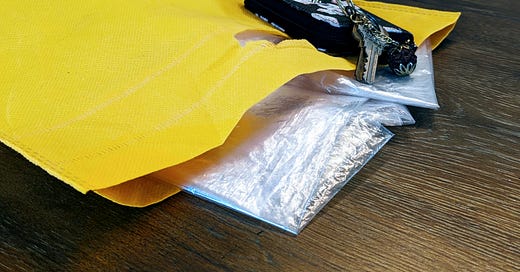I am hopefully preaching to the choir when I say “Let’s reduce using plastics”. But what about grocery shopping? Lets jump right into it!
A lot of us are already in the habit of carrying our reusable cloth bags to the grocery store. Most stores offer plastic baggies to hold each kind of fresh produce, and we end up using ~ 8 or 10 each time. Convenience and availability of plastic baggies makes it a hard one to beat. It got me wondering what Mom did in those simpler times when baggies were never an option. Aha!
One fine morning, I took my bright yellow cloth bag to the store’s produce section. I picked up a few tomatoes and avocados and put them directly into my cloth bag. I walked over to the self-checkout counter, emptied the bag, scanned and placed them back in. I indicated 0 store bought bags on the checkout screen, paid my bill and walked myself right out the door… and I survived.
Yes – this is not easy for the full-blown grocery shopping task. So here’s a very simple idea:
While you plan your transition to reusable cloth/organza/muslin/paper bags, REUSE those plastic baggies.
Most fresh produce stored in plastic bags spoil since these bags retain moisture. Simply unload your groceries and save the bags to use in the next visit. Paper bags are also useful in transporting and storing produce. While paper bags consume considerable energy in the production phase, they do decompose in landfills. The final step is to keep a few reusable brown paper reusable bags, or organza drawstring bags, or muslin bags, or mesh bags handy to bag essential items and produce. So please remember, either way REUSE is key.
A study conducted a few years ago revealed that an average US household was using ~1500 plastic bags each year. With all the awareness and changes in grocery stores over time, let’s say an average household does grocery store visits ~50 times in a year. Let’s assume conservatively that ~10 plastic baggies are used by the household for fresh produce (since it’s usually not pre-packaged in plastic). With the above idea 1 household has saved ~500 bags in 1 year. So if 1000 families adopted this we have collectively avoided using ~500,000 new plastic bags in 1 year. Now imagine the impact if your entire city did this…




